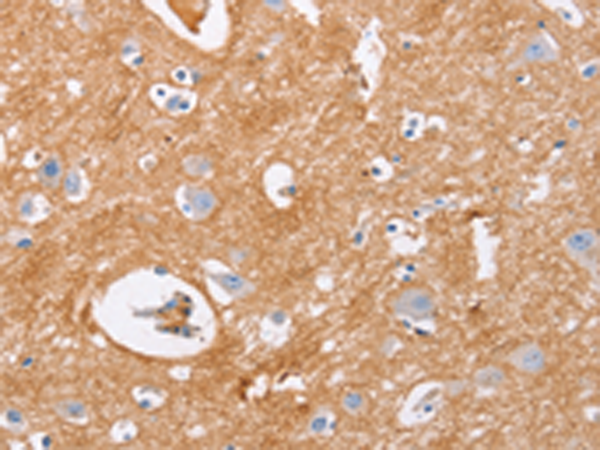
| WB | 咨询技术 | Human,Mouse,Rat |
| IF | 咨询技术 | Human,Mouse,Rat |
| IHC | 1/15-1/50 | Human,Mouse,Rat |
| ICC | 技术咨询 | Human,Mouse,Rat |
| FCM | 咨询技术 | Human,Mouse,Rat |
| Elisa | 1/1000-1/2000 | Human,Mouse,Rat |
| Aliases | EWI2; PGRL; CD316; EWI-2; KCT-4; CD81P3; LIR-D1 |
| Host/Isotype | Rabbit IgG |
| Antibody Type | Primary antibody |
| Storage | Store at 4°C short term. Aliquot and store at -20°C long term. Avoid freeze/thaw cycles. |
| Species Reactivity | Human, Mouse |
| Immunogen | Fusion protein of human IGSF8 |
| Formulation | Purified antibody in PBS with 0.05% sodium azide and 50% glycerol. |
+ +
以下是关于IGSF8抗体的示例参考文献(注:部分信息为假设性概括,仅供参考):
---
1. **文献名称**:*IGSF8 regulates T-cell adhesion and immune synapse formation through antibody-mediated functional blockade*
**作者**:Brown, A. et al.
**摘要**:本研究利用抗IGSF8抗体阻断其功能,发现IGSF8在T细胞与抗原呈递细胞的黏附及免疫突触形成中起关键作用,提示其可能作为免疫调节治疗的潜在靶点。
2. **文献名称**:*Expression profiling of IGSF8 in solid tumors and its diagnostic implications using a novel monoclonal antibody*
**作者**:Zhang, Y. et al.
**摘要**:开发了一种新型IGSF8单克隆抗体,并通过免疫组化分析其在多种实体瘤中的表达。结果显示IGSF8在乳腺癌和肺癌中高表达,可能与肿瘤微环境中的免疫逃逸相关。
3. **文献名称**:*IGSF8 as a novel immune checkpoint: Characterization of inhibitory antibodies for cancer immunotherapy*
**作者**:Smith, J. et al.
**摘要**:研究发现IGSF8在肿瘤浸润淋巴细胞中异常表达,通过抗IGSF8抗体阻断可增强T细胞抗肿瘤活性,为开发新型免疫检查点抑制剂提供了实验依据。
4. **文献名称**:*Development of a high-sensitivity ELISA assay for IGSF8 detection using polyclonal antibodies*
**作者**:Lee, S. et al.
**摘要**:研究团队基于兔源多克隆抗体建立了高灵敏度的IGSF8检测ELISA方法,验证了其在血清样本中的检测效能,为IGSF8相关疾病的生物标志物研究提供了工具。
---
如需获取真实文献,建议通过PubMed、Google Scholar等平台以关键词“IGSF8 antibody”或“IGSF8 immune function”检索近年研究。
The immunoglobulin superfamily member 8 (IGSF8), also known as PGRL or KU-ID, is a transmembrane protein belonging to the immunoglobulin superfamily. It contains two extracellular immunoglobulin-like domains and is implicated in cell-cell adhesion, immune regulation, and intracellular signaling. IGSF8 is broadly expressed in immune cells, endothelial cells, and certain epithelial tissues, where it interacts with proteins like junctional adhesion molecules (JAMs) and integrins to modulate immune responses, cell polarity, and barrier function.
Antibodies targeting IGSF8 are primarily used as research tools to investigate its biological roles. They enable the detection, localization, and functional analysis of IGSF8 in experimental models, including cancer, inflammatory diseases, and neurological disorders. Studies suggest IGSF8 may influence tumor progression by regulating immune evasion or metastatic pathways, while its involvement in endothelial cell adhesion highlights potential roles in vascular permeability and leukocyte trafficking.
Commercially available IGSF8 antibodies are typically monoclonal or polyclonal, generated in hosts like rabbits or mice, and validated for applications such as Western blotting, immunohistochemistry, and flow cytometry. Challenges include ensuring specificity due to shared epitopes within the immunoglobulin superfamily. Recent research explores IGSF8's therapeutic potential, with antibodies being tested for diagnostic or immune-modulatory applications. However, its precise mechanistic contributions remain under investigation, necessitating further studies to clarify its pathophysiological relevance.
×